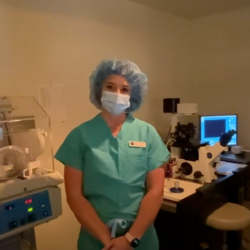
If you’re trying to decide how many embryos to transfer during an IVF cycle, know that it can be an emotional and difficult decision. If you’ve been trying to get pregnant for a while, you may want to increase your chances by transferring two or more embryos. “Twins!” you think, hoping that you can be done with IVF after just one pregnancy. This may also be the case if cost or your age is a concern.
However, for our patients, with the exception of those age over 38 or who have had two single embryo transfers without becoming pregnant, we recommend transferring one embryo. Single embryo transfers are undeniably safer for the mother’s and baby’s continued health. Here’s why.
Single vs Multiple Embryos
A single embryo transfer during IVF is the standard of care for the majority of people trying to conceive. The CDC, American Society for Reproductive Medicine, and the Society for Assisted Reproductive Technology all recommend one embryo transfers for most IVF patients.
Why is that? It comes down to safety and success rates.
With IVF therapy, your primary goal is to have a healthy baby. When transferring double or multiple embryos, your chances of having twins or multiple births also understandably goes up. However, risks to the baby’s and your health also increase.
Challenges associated with multiple births
Multiple births carry a number of challenges. For example:
- Almost 60% of twins are delivered preterm, while 90% of triplets are preterm
- Life-threatening maternal complications are two times higher among twin pregnancies and maternal death is almost four times higher
- Multiple births increase the risk of premature birth and low birth weight in infants, affecting the long-time well-being of these children
These challenges are lowest with twins, but as the American Pregnancy Association explains “each additional baby a woman carries during her pregnancy increases the possibility of developing pregnancy complications.”
It’s good to be aware of these challenges, but thankfully due to modern medicine and care, preterm births at 26 weeks have an 80% survival rate, and the rate improves exponentially after that. In fact, the premature birth rate in the United States dropped year after, to 11.4 percent of all births in 2013, which was the goal for 2020!
Success rates of single embryo transfer vs. double embryo transfer
Another reason that leading reproductive health agencies recommend single embryo transfers during IVF is that, for many people, success rates for single (SET) vs. double embryo transfers (DET) are similar.
The CDC notes that:
“Among women with a good chance of success with ART, those who chose to have a single embryo transferred had a similar number of live-birth deliveries compared to those who chose to transfer multiple embryos, but almost all of the infants they delivered were singletons.”
One study from Gynécologie Obstétrique & Fertilité found that single embryo success rates were 36%, compared to 35% for double embryo transfers. Another from Fertility Research And Practice showed a 45% success rate for SET and a 42% success rate for DET.
When should I consider single embryo transfer?
While the majority of patients should use single embryo transfers during IVF. You should have single embryo transfers if you:
- Have a favorable prognosis for IVF therapy
- Are 38 years or younger
- Have good quality eggs and embryos
- Have not yet attempted IVF therapy
When should I consider multiple embryo transfers?
The American Society for Reproductive Medicine designed clear embryo transfer guidelines for different populations. You may want to transfer two or more embryos if you:
- Are over the age of 38
- Have undergone multiple IVFs cycle with no success
- Have an unfavorable prognosis for IVF
See the following ASRM guidance chart for more information.
Learn more about your IVF options
Deciding how many embryos to transfer for IVF is a difficult decision. Your fertility journey is unique and based on your own situation and needs. Your fertility journey is unique and based on your own situation and needs.
For more information about our approach to IVF therapy and embryo transfer at the Fertility Institute, read our overview ‘or contact the Fertility Institute today to talk to one of our fertility specialists.



